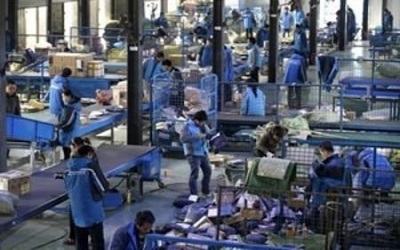Shopping online带动中国快递行业飞速发展争相上市,外媒都惊呆了!这篇新闻报道不仅覆盖了小作文的列数据和大作文的观点陈述,同时还有采访问答在口语中的应用,墨尔本文波雅思独家为你解析!
China’s couriers don’t want to be alone on Singles Day
On China’s giant Singles Day internet shopping festival, the country’s delivery firms are stretched so thin (“如此紧绷”)that they are looking for tie-ups, listings and new investors to husband (“节约使用管理”,不是丈夫的意思,地道表达)their resources.
E-commerce has been a huge boon(“利益”) to the logistics (“后勤”)industry, but the ever-bigger (“时刻都在增长的”)Singles Day, run by leading online market Alibaba Group Holding Ltd on Nov. 11 every year, exacerbates (“加剧,恶化”,9分词汇)the industry’s twin dilemmas of(“双重困境”) cut-throat competition(“恶性竞争”) and rising labor costs.
With low barriers to entry, express couriers proliferated (“增殖”)rapidly over the past decade to more than 8,000 firms, squeezing profit margins to (“挤压利润”)about 5 percent, down from 30 percent 10 years ago, according to analysts.
Singles Day, which overtook the U.S.’s Cyber Monday as the world’s biggest shopping event in 2012, generated sales of $9.3 billion in 2014. Parcel deliveries are expected to rise 42 percent to 760 million this week, creating a logistical headache for the army of companies that will bring them to the customer’s door.
The planning began three months ago for Shanghai-based Zhongtong (ZTO) Express, one of China’s largest couriers, which saw parcel volumes jump fourfold (“增长四倍”)during last year’s event.
The firm, which currently employs a quarter of a million people and has 28,000 delivery vehicles, said it decided to add 40,000 temporary and permanent workers, buy an extra 7,000 vehicles and open dozens of sorting centers, at a cost of tens of millions of dollars.
“We don’t treat Singles Day like business, it’s our responsibility,” said Zheng Chao, its marketing director.
It is to ease the burden and meet the cost of such investment that delivery companies are considering stock market listings and mergers and opening up to outside funding, providing investors access to a rapidly growing sector that is mostly in private hands.
“The industry’s restructuring is not wholly driven by Singles Day, but Singles Day may make the competitive pressures more evident (“更加明显”),” said Yan Shujun, analyst at China Logistic Information Center.
GOING PUBLIC
ZTO’s Zheng said his company was targeting a 2017 listing.
“Express delivery firms are very asset-heavy. Going public (动名词作主语还是挺好用的,同义替换“上市”)can offer additional development funds and capital,” he said.
“There are a couple of companies that are hoping to list as soon as possible,” he added.
Rival Shentong Express said in September it would merge its assets with that of another large courier, Tiantian Express. It is also pursuing a back-door listing (“借壳上市”)through a Shenzhen valve-maker, it told Reuters last month.
Despite the huge number of firms and double-digit annual growth in the sector, there have been few capital market deals and most companies are still run by their founders, who often started with small fleets (“车队”)of trucks or motorcycles.
The industry generated $33 billion in revenue last year, but there have been just 27 deals worth a total of $279 million between 2008 and 2014, according to data from Deloitte. But that appears to be changing.
“When the competitive pressures grow, there will be more willingness for (非常实用的表达)leading express companies to move faster on the capital markets side,” said Zhang Tianbing, partner for strategy and operations at Deloitte.
The Chinese government has also thrown its support behind consolidation, saying last month that it would help the industry become more internationally competitive, improve domestic logistic infrastructure and safety standards.
“In the past, the logistics firms competed on who could grab more volume, who could absorb goods (“吸收、承受货物”),” said Zheng. “Now logistics firms are growing at a pace faster than the e-commerce firms … Small companies have no hope of surviving.”





